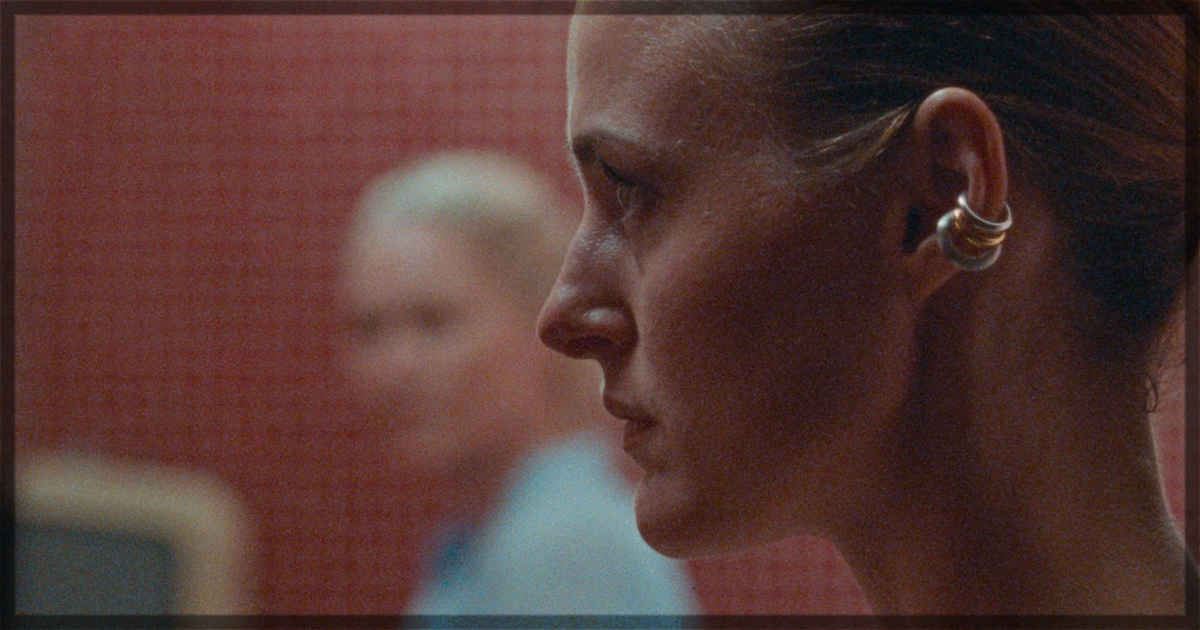At first glance, Armand – from writer and director Halfdan Ullmann Tøndel in his feature debut – seems cut from the same cloth as Roman Polanski’s 2011 film Carnage and Fran Kranz’s 2021 film Mass: thrillers of the interpersonal, where parents of squabbling, troubled, or otherwise problematic children come together to solve their differences in the absence of the younger generation.
In Armand, the young and naive teacher Sunna (Thea Lambrechts Vaulen), encouraged with no real practical support by school principal Jarle (Øystein Røger), brings together Armand’s mother Elisabeth (Renate Reinsve) and Jon’s parents Sarah (Ellen Dorrit Petersen) and Anders (Endre Hellestveit) for an after-school chat. The six-year-old Armand and Jon have been best friends, constantly at the other’s house, but Jon came home one day with injuries and alleged that Armand was the cause. The school might be interested in mediation and getting to the bottom of the shadowy situation, but the parents are – naturally, but regrettably – most concerned with protecting their children from potential abuse and/or malicious rumours. Elisabeth also begins to suspect that Sarah and Anders’ grievances go beyond this one alleged altercation. Even with this additional layer, Armand treads familiar ground with this pressure-cooker scenario.
This, however, is where similarities with the earlier, stagier films mentioned end. A break with reality is hinted at in the first half, but in the second half Armand almost leaves this slice-of-life setting behind and becomes a full-fledged melodrama as secrets between the two families unfold. Almost psychedelic sequences illustrate desires and regrets long hidden between the adults; whether or not the children have picked up on these, or are merely the vessels for the parents’ projections, is left tantalisingly ambiguous. What happened – or did not happen – eventually between the boys becomes the least important facet of the story and its resolution.
Ullmann Tøndel is the grandson of Liv Ullmann and Ingmar Bergman (perhaps the fact that, in Armand, Elisabeth is an actress struggling with her fracturing mental health and personal life is itself a reference to Persona, starring Ullmann and directed by Bergman). In some ways he makes Armand more of an exercise in acting and in style than a satisfying coherent theme and plot. The surreal bent is effective when framing the school – an everyday place for children’s learning – as a receptacle for secrets around every corner and down every hallway, but abstraction does not quite gel with the personal stakes and slowly-revealed tragic histories connecting the two families.
What Ullmann Tøndel does very well in Armand is the atmosphere. His camera wanders past the conversation, only to meander back around to them – an ominous, oppressive touch that hints at secrets unspoken. This dreamlike touch further obfuscates reality and fiction, the past and the present, creating both a hyper-believability and a scepticism around each new discovery and declaration. Only time, ensuing revelations, and each character’s perception thereof can tell if these add to the truth or the lies.
The performances are uniformly excellent, balancing sympathy with the most frustrating human tendencies for counterproductive conflict resolution, and keep the audience connected even as the plot’s themes waver. Following The Worst Person in the World, Renate Reinsve returns to the screen with four performances in 2024, including a fantastic turn in Aaron Schimberg’s excellent English-language dark comedy A Different Man. Reinsve charts a harrowing journey here as a cornered woman whose reactions betray her: she first seems blindsided by the meeting and allegations against her son, but fits of laughter and temper leave Elisabeth’s honesty and knowledge of the situation vague. Each look at her surroundings and tensed reflex to cajoling and critical words feels natural, yet mesmerising in only the way an accomplished actress can achieve.
Debates around language and agency in Armand are also compelling. The children at the centre of this debate, Jon and Armand (both never seen), are a mere six years old – barely beginning their school experience. Without going into details of what is on the table, a key question centres around whether or not Jon and Armand could have said, or could have known what they were saying in regards to, the words Sarah attributes to her son. The corruption of innocence and parents’ desires to protect their children from the world at all costs come up against the reality that this bubble will burst in the end. Furthermore, the generational divide in what young people have access to is continually evolving: childhood in an age of internet and smartphones, such as Jon and Armand’s, looks very different to what Elisabeth, Sarah, and Anders have experienced themselves and envisage for their children.
As an exploration of familial trauma and moral grey areas, Armand is ultimately less than the sum of its parts, perhaps due to familiarity with the overall set-up of the film, but fans of Reinsve would be amiss to let this one pass them by. The actress continues to prove herself one of this generation’s singular talents and humanise characters caught in seemingly impossible conundrums. Likewise, Ullmann Tøndel demonstrates a remarkable confidence in framing and atmosphere, and his career is one to follow.
Armand recently screened at the Belfast Film Festival.
You might also like…
‘Universal Language’ Movie Review: A Nostalgic, Fantastical Journey (Belfast Film Festival)


